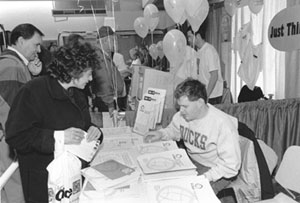The 1998 UW Computer Fair

For the second year in a row, I helped out at the DO-IT booth at the UW Computer Fair. This time, it turned out to be better than last year since I knew where I was going to stay and how I was going to get there. I also learned how to use the online networks to help me plan my trip. I tapped into the Seattle Network Online to find the number of the hotel, major cab companies, and metro transportation. I had also pre-arranged for the DO-IT staff to meet me at the Husky Union Building.
This year, I went from Oregon to Seattle by railroad. Amtrak was economical compared to the airlines. It was only $31 round trip. I learned about their special rate for people with disabilities and got a round-trip ticket for $27. I took my portable phone with me so my counselors could call me if there was any problem. Because I am blind, the wireless phone has proven to be a useful tool. This is because it is harder to find phone booths especially in a big building. I pre-arranged with the hotel for them to take me to the university. The DO-IT staff had already set up a time to meet me at the building and I made sure to set it up so I would arrive at that time.
The first day of the Fair was one of the busiest days. I had a long line of people wanting to know about speech access for PC systems. I thought I was going to be hoarse by the end of the day because I had been talking so much. The most common misconception was that blind people use PCs with speech input. They thought that speech input was the same as speech access. I had to explain the difference.
On the first evening of the Computer Fair, I got to take part in a presentation that Sheryl and Julie were giving. It was about the DO-IT program and work-based learning experiences. I covered information about the technology I use and how I use it for both preparing to work and on the job. I returned to my room after the presentation.
The second day was somewhat quieter. I did not have as many people wanting to talk to me as I did before. My uncle who works as an instructor at the university came to the booth. I had a lot of people asking about the DO-IT program and how it worked. There were quite a few people in line at the end and the others at the booth were making jokes about conserving my voice so I could talk to my family. I had the hotel pick me up at 5:15. When I got back to my room, I called my relatives and we went out to dinner together. It felt good to break loose after two really busy days.
The following day, I was supposed to go from Seattle to Southern Oregon. I woke up at 5:00 am that day, finished packing up, and checked out of the hotel. I went from the hotel to the railroad station via Access Transportation, which is Seattle's special service for people with disabilities. They let me off right in front and the driver took me into the station. I made it back to Portland, went from the station to the air terminal, and caught a flight to Southern Oregon. By the time I got there, I was very tired out, but I knew I had completed a successful mission. I am very glad I attended the technology fair, and there are some lessons I learned by going on this trip. Some words of advice I would give to someone else are:
- If you have a wireless phone, you should keep it on while you are on the road. This gives people a way to get hold of you in case of emergency.
- If you plan to take a cab to your hotel, pick one that is going to accommodate you the best. This sometimes requires asking your hotel which one they would recommend. When you arrive, you should tell the porters which company you want and what kind of assistance you need.
- The online networks can function as your personal trip planner. If you are looking for information on transportation, lodging, or any other type of information, there are online services that can help you find what you are looking for. Once you have found the information that you want, you should download it and keep it on hand for future reference.
- If you have a portable talking clock, you should take it with you so you don't have to worry about getting a wakeup call.
- Communication is the key to a successful mission. As long as you can be up-front with people and tell them what kind of assistance you need, your trip will most likely be successful.
I've learned that being visually impaired does not make it impossible to attend the technology fair or go on any other mission. It just takes planning ahead and being determined to achieve what you want.